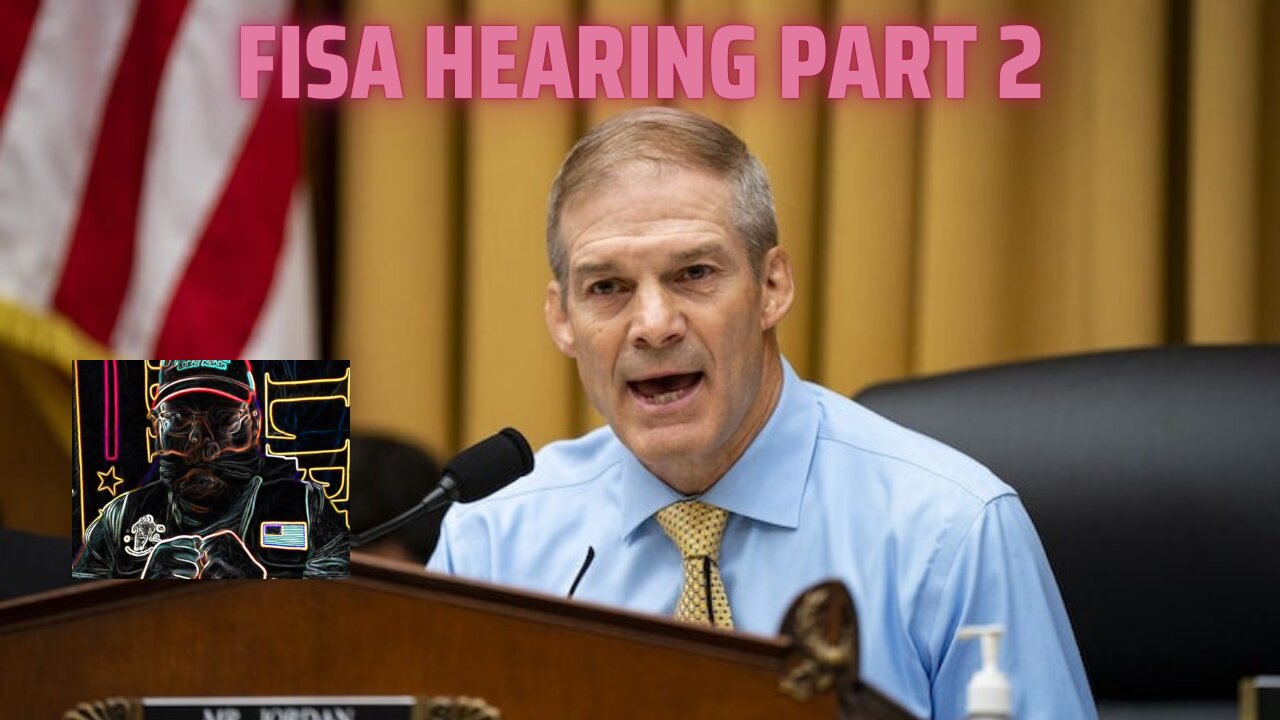Premium Only Content

Fixing FISA II - Hearing in the Judiciary Committee
FISA stands for the Foreign Intelligence Surveillance Act. It is a United States federal law that governs the surveillance activities of the U.S. intelligence agencies, particularly when conducting surveillance on foreign individuals located outside the United States. FISA was enacted in 1978 and has been amended several times since then.
Under FISA, a special court called the Foreign Intelligence Surveillance Court (FISC) was established to review and authorize requests for electronic surveillance, physical searches, and other forms of intelligence gathering against foreign agents or suspected foreign agents. The court's proceedings are secret and non-adversarial, meaning that only the government presents its case, and there is no opportunity for the subject of surveillance to contest it.
FISA allows the U.S. government to collect intelligence on non-U.S. persons reasonably believed to be outside the United States, even if the surveillance incidentally captures communications of U.S. persons. However, to target a U.S. person, the government needs to establish probable cause that the individual is an agent of a foreign power.
FISA has been a subject of debate and controversy, particularly concerning its potential impact on civil liberties and privacy rights. Critics argue that FISA can be abused to conduct warrantless surveillance on U.S. citizens or collect information for purposes unrelated to national security. Proponents, on the other hand, assert that FISA is crucial for protecting the country against terrorism and other threats by providing a legal framework for intelligence gathering.
It's worth noting that my knowledge is based on information available up until September 2021, and there may have been developments or amendments to FISA since then. For the most up-to-date information, I recommend consulting official sources and legal experts.
-
 25:49
25:49
Stephen Gardner
7 hours ago🔴Trump Was RIGHT! Newsom’s HUMILIATING Report EXPOSED!
38.9K19 -
 1:36:46
1:36:46
Tucker Carlson
6 hours agoThe Pentagon Didn’t Fire Dan Caldwell Over Leaks. They Fired Him for Opposing War With Iran.
122K140 -
 LIVE
LIVE
SpartakusLIVE
7 hours agoGames w/ StoneMountain64 || Duos w/ StevieT into the night
634 watching -
 1:34:18
1:34:18
JustPearlyThings
5 hours agoHigh Value Men Are Happy With Wives That Are Mid (Call-in Show) | Pearl Daily
39.2K23 -
 10:32:15
10:32:15
ttvglamourx
12 hours ago $1.99 earnedBIRTHDAY STREAM !DISCORD
26.4K9 -
![[Macho Madness] Featuring G2G, Lanc & Mochi [ Fortnite --> Ghost Recon Wild Lands ]](https://1a-1791.com/video/fww1/fe/s8/1/h/g/6/D/hg6Dy.0kob-small-Macho-Madness-Featuring-G2G.jpg) LIVE
LIVE
CHiLi XDD
7 hours ago[Macho Madness] Featuring G2G, Lanc & Mochi [ Fortnite --> Ghost Recon Wild Lands ]
140 watching -
 2:17:35
2:17:35
We Like Shooting
17 hours ago $2.16 earnedWe Like Shooting 607 (Gun Podcast)
32.9K2 -
 2:01:40
2:01:40
Joker Effect
4 hours agoYOU WOULD NEVER CLICK THIS BECAUSE YOU ARE SCARED YOU WILL LOVE IT.
27.9K2 -
 UPCOMING
UPCOMING
Anthony Rogers
1 day agoEpisode 363 - Can A.I. Be Used to Talk to the Dead?
17.5K2 -
 6:14:39
6:14:39
Meisters of Madness
7 hours agoThe Umbral Playthrough - Part 2
18.5K1